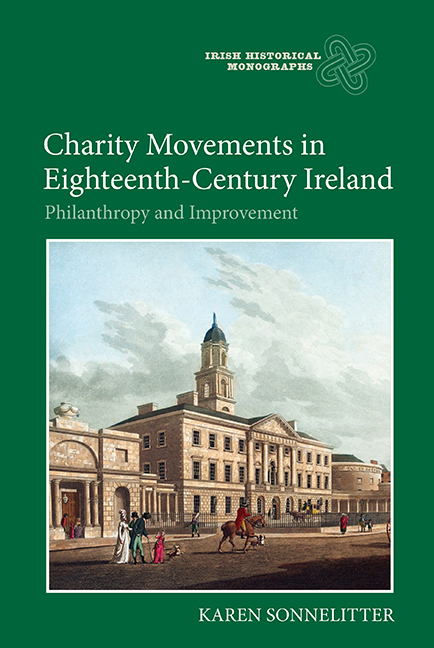Book contents
- Frontmatter
- Dedication
- Contents
- List of Figures
- Acknowledgements
- Abbreviations
- Introduction: Ireland in the Eighteenth Century: The Case for Improvement
- 1 ‘The Worst in Christendom’: The Church of Ireland and Improvement
- 2 Education and Charity: The Incorporated Society for Promoting English Protestant Schools in Ireland
- 3 To Cure and Relieve: Voluntary Hospitals in Eighteenth-Century Dublin
- 4 Improvement as Philanthropy: The Royal Dublin Society
- 5 ‘The Benevolent Sympathies of the Female Heart’: Women, Improvement, and the Work of Lady Arbella Denny
- 6 National and Local Government and Improvement
- Conclusion: Philanthropy and Improvement in Eighteenth-Century Ireland and Beyond
- Bibliography
- Index
Conclusion: Philanthropy and Improvement in Eighteenth-Century Ireland and Beyond
Published online by Cambridge University Press: 11 May 2021
- Frontmatter
- Dedication
- Contents
- List of Figures
- Acknowledgements
- Abbreviations
- Introduction: Ireland in the Eighteenth Century: The Case for Improvement
- 1 ‘The Worst in Christendom’: The Church of Ireland and Improvement
- 2 Education and Charity: The Incorporated Society for Promoting English Protestant Schools in Ireland
- 3 To Cure and Relieve: Voluntary Hospitals in Eighteenth-Century Dublin
- 4 Improvement as Philanthropy: The Royal Dublin Society
- 5 ‘The Benevolent Sympathies of the Female Heart’: Women, Improvement, and the Work of Lady Arbella Denny
- 6 National and Local Government and Improvement
- Conclusion: Philanthropy and Improvement in Eighteenth-Century Ireland and Beyond
- Bibliography
- Index
Summary
To Anglo-Irish improvers their work was a form of patriotic action. Involvement in charity movements was a way to combine the Christian obligation to aid the less fortunate with their civic duty to the Irish state. Yet committed improvers did not represent the Anglo-Irish ruling class as a whole. There were many members of the gentry and aristocracy who through their lifestyle and actions expressed a profound indifference towards the fate of Ireland and its people. The sermons and pamphlets produced by charitable societies regularly exhorted their audience to perform their Christian duty towards the less fortunate, but were not always successful. In 1717 Dean Rowland Davies of Cork told his listeners that charity was not only necessary for salvation; it was also a civic duty. ‘That it is out greatest prudence, as well as Christian Duty, to manage our present Fortune in order to our future happiness; and so to dispose of these transitory enjoyments, as that we may purchase by them an everlasting habitation.’ Concern over personal salvation, a sense of religious obligations, and paternalism towards the lower classes were all a part of the philanthropic mindset. While Anglo-Irish anxieties over security lay behind many of the philanthropic endeavours examined in this book, the activities of those who did work for improvement reflect an Enlightenment-era optimism about the perfectibility of society. Philanthropists and improvers believed that by addressing the roots of social problems they could eradicate them.
This book has examined several different organizations, each focusing on different social or economic difficulties affecting eighteenth-century Ireland. While these organizations varied with regards to methods and focus they shared many common goals. The charity movements examined here illustrate a shift in philanthropic activity and the aims that motivated it. These organizations were meant to serve the interests of the state as well as the interests of society and religion. Some philanthropists, such as John Putland and Lady Arbella Denny, were clearly motivated by sincere religious conviction, but even they also saw their endeavours as serving the practical interests of the nation in concrete ways. Many improvers were motivated more by rational self-interest then by any genuine charitable principle.
- Type
- Chapter
- Information
- Charity Movements in Eighteenth-Century IrelandPhilanthropy and Improvement, pp. 170 - 178Publisher: Boydell & BrewerPrint publication year: 2016



